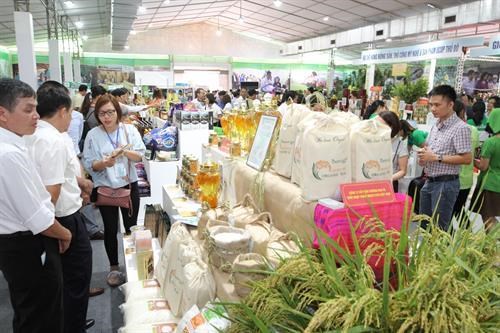Hanoi unlocks consumption potential of rural areas, industrial zones
The capital city of Hanoi’s industry and trade sector has developed models to supply “made-in-Vietnam” products to rural areas, as well as industrial and processing zones which employ millions of labourers.
 Products on display at the "One Commune, One Product" fair of Hanoi on September 21-22 (Photo: VNA)
Products on display at the "One Commune, One Product" fair of Hanoi on September 21-22 (Photo: VNA)Hanoi (VNA) – The capital city of Hanoi’s industry and trade sector has developed models to supply “made-in-Vietnam” products to rural areas, as well as industrial and processing zones which employ millions of labourers.
Nguyen Thi Na, a worker at the Thach That Industrial Park in the capital city of outskirt district of the same name, said she had frequently purchased foreign products as she assumed they were better than those locally-made.
“However, since I visited markets exclusively for made-in-Vietnam products, I have realised that they have diversified packaging and their quality is not lower than imported goods. More importantly, they are sold at reasonable prices and with clear origins. Therefore, I now prefer Vietnamese goods,” she said.
According to Tran Thi Phuong Lan, Deputy Director of the municipal Department of Industry and Trade, over the past years, Hanoi has integrated activities introducing Vietnamese goods at the city’s industrial and processing zones into the market stabilisation programme to help labourers, especially low-wage workers, access good quality products at affordable prices.
During the 2009-2019 period, the municipal Department of Industry and Trade has teamed up with agencies, localities and management boards of industrial and processing zones to instruct businesses to organise about 3,200 mobile goods-selling vehicles, 254 fairs and other promotion activities.
Besides, they have provided products for canteens of the industrial and processing zones, and mountainous and remote areas in Ba Vi, Quoc Oai, Thach That, My Duc, Son Tay and Phuc Tho districts.
Vu Thi Hau, Vice President of the Vietnam Association of Retailers (VRA), said fairs in rural areas and industrial and processing zones have helped retailers promote their brands and tap the potential of the rural market.
These programmes have also connected firms with consumers, and helped enterprises explore the demand and tastes of local consumers to adjust their production strategies and roll out suitable distribution channels, thus improving their market shares in rural areas, she added.
Through such activities, local consumers have changed their consumption habits towards made-in-Vietnam products, Hau said.
However, experts pointed out that promotion activities are still held seasonally, and mobile goods-selling vehicles have failed to attract consumers due to undiversified products.
Moreover, few retailers are interested in the programme on introducing Vietnamese products to rural areas.
Nguyen Thi Hai Thanh, Deputy General Director of the Hanoi Trade Joint Stock Corporation (Hapro), explained that businesses have not earned much through the programme, and some districts and management boards of the industrial and processing zones have shown little interest in the mobile goods-selling vehicles and fairs.
Given this, Tran Thi Phuong Lan, Deputy Director of the municipal Department of Industry and Trade, suggested trade unions and management boards of industrial and processing zones work with businesses in communications and help them with venues and tax.
Participating businesses want to receive the State’s support in transportation costs and marketing to raise their competitiveness against foreign investors, she noted.
Echoing Lan’s view, VRA President Dinh Thi My Loan also suggested the Ministry of Industry and Trade and local authorities put forth a long-term, synchronous and flexible strategy to encourage local firms to promote their products in rural areas.
The municipal Department of Industry and Trade said to further implement the campaign “Vietnamese prioritise using Vietnamese products,” it will work with relevant agencies to review policies on land, planning, science-technology, loans, brand building and trade promotion.
The Department of Industry and Trade will propose authorised agencies facilitate production expansion, market survey, technological innovation, brand building and network development of businesses, while helping them engage in the market stabilisation programme.
It will also push ahead with the development of retail networks in Hanoi’s outskirt localities, with stable venues./.













